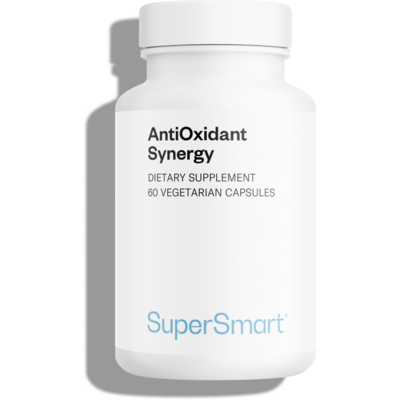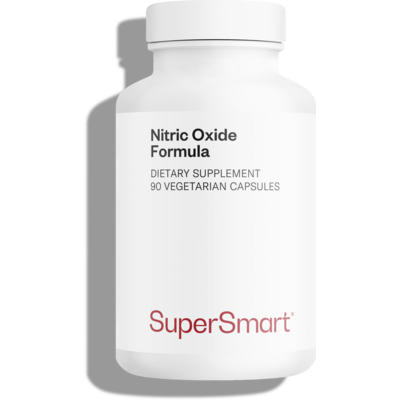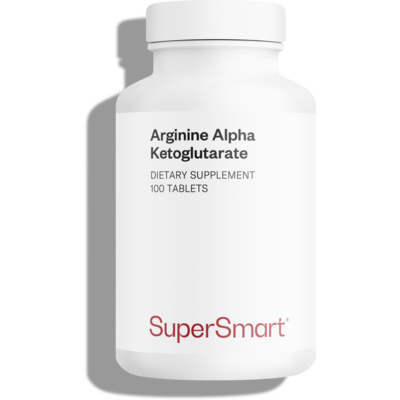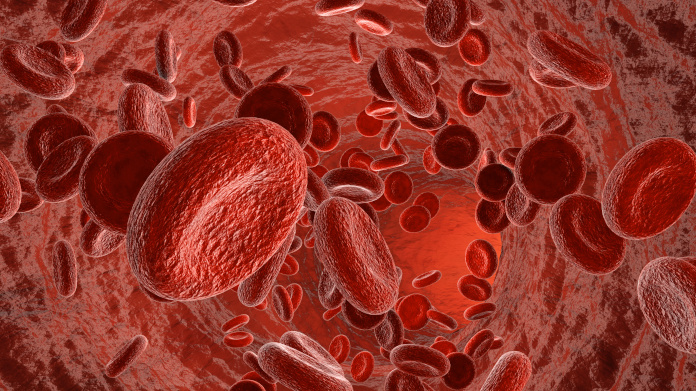Nitric oxide: what are the benefits of this vasodilator? How can you boost your body’s levels of it?
A gas produced naturally by the body, nitric oxide has highly beneficial properties for health: for blood flow, male and female sexual vigour, immunity, digestion … Here we explore nitric oxide’s benefits and offer some tips for boosting your body’s levels of it.

Nitric oxide (NO): a gas produced by the body
Nitric oxide (NO), nitrogen oxide, nitrogen monoxide: all these terms refer to the same molecule which is composed of one atom of oxygen and one of nitrogen (1).
This naturally-occurring gas is produced by mammals from an amino acid called L-arginine, which is therefore one of its precursors.
Health benefits of nitric oxide
With regard to its benefits in the body, nitric oxide :
- is produced and used by the endothelium of blood vessels as a vasodilator: it helps to dilate blood vessels and increase blood flow. Its role in the body is particularly crucial for erections of the penis, clitoris and nipples;
- is released by certain cells of the immune system (including macrophages), to eliminate or prevent the growth of pathogenic bacteria;
- is also present as a neurotransmitter in digestive tract organs, where it acts as a smooth muscle relaxant. This action helps the stomach to distend and store liquid food;
- acts in conjunction with glutathione as a regulator of apoptosis (programd cell death). It can therefore exert either an apoptotic or anti-apoptotic effect (2).
What kinds of people would normally be looking to increase their nitric oxide levels?
The idea of increasing nitric oxide levels would be of particular interest to:
- those experiencing erectile dysfunction;
- bodybuilders and sports enthusiasts in general (3). The vasodilatory effect of nitric oxide helps to maximise blood flow to the muscles, making them swell as they become engorged with blood. This sensation is much sought-after by sportspeople as it involves an optimal supply of oxygen and nutrients to the muscles, (4);
- those looking to support their immune defenses or reduce their inflammation (5): a study published in 2017 suggested that nitric oxide acts as a regulator in people without cardiovascular disease (6). However, those who have a risk of heart disease (or other health concern) should not seek to raise their nitric oxide levels without first consulting a doctor;
- etc.
Natural tips for boosting your nitric oxide levels
It’s possible to increase your blood levels of nitric oxide naturally:
- by eating nitrate-rich vegetables. These include green leafy vegetables such as lettuce, rocket and chard, as well as beetroot and watermelon. Nitrates can be converted in the body into nitrites and then into nitric oxide;
- antioxidants can also help maintain and promote nitric oxide production in the body by protecting existing nitric oxide and its precursors against free radicals, or by activating the enzymes that produce it;
- exercise (walking, jogging, cycling, swimming…) also stimulates the activity of nitric oxide synthase NOS), an enzyme crucial for nitric oxide production.
In short, adopting an anti-inflammatory and antioxidant lifestyle is excellent for maintaining nitric oxide levels: don’t smoke, reduce your alcohol consumption, avoid foods high in fat, salt, and sugar, etc.
Supplements that can help boost nitric oxide
Given that arginine is an amino acid precursor of nitric oxide, taking an arginine supplement is an excellent way of boosting nitric oxide levels in the body (ideally, opt for one in the form of arginine alpha-ketoglutarate, which is more effective than simple L-arginine).
Similarly, citrulline is an amino acid precursor of arginine but with better bioavailability, so many people choose to take citrulline to boost their NO levels (with supplements such as L-Citrulline) (7).
Last but not least, there are synergistic formulations which, for even greater efficacy, combine different molecules studied for their potential to increase nitric oxide (such as Nitric Oxide Formula, in which L-arginine in the form of alpha-ketoglutarate is combined with L-citrulline, as well as antioxidant polyphenols, agmatine sulfate and aspartic acid).
You can also further boost your antioxidant intake (with a supplement such as AntiOxidant Synergy, rich in antioxidant compounds such as green tea, pine bark, resveratrol, etc.)
SuperSmart ADVICE
References
- ROBBINS, Richard A. et GRISHAM, Matthew B. Nitric oxide. The international journal of biochemistry & cell biology, 1997, vol. 29, no 6, p. 857-860.
- SNYDER, Solomon H. et BREDT, David S. Biological roles of nitric oxide. Scientific American, 1992, vol. 266, no 5, p. 68-77.
- BURNETT, Arthur L. Role of nitric oxide in the physiology of erection. Biology of reproduction, 1995, vol. 52, no 3, p. 485-489.
- MAIORANA, Andrew, O’DRISCOLL, Gerard, TAYLOR, Roger, et al.Exercise and the nitric oxide vasodilator system. Sports Medicine, 2003, vol. 33, p. 1013-1035.
- HOSKING, Hannah. Nitric oxide and the immune system: a literature review.
- https://www.diplomatie.gouv.fr/fr/politique-etrangere-de-la-france/diplomatie-scientifique-et-universitaire/veille-scientifique-et-technologique/hong-kong/article/les-vaisseaux-sanguins-sensibles-a-l-oxyde-nitrique
- EL-HATTAB, Ayman W., EMRICK, Lisa T., CRAIGEN, William J., et al.Citrulline and arginine utility in treating nitric oxide deficiency in mitochondrial disorders. Molecular genetics and metabolism, 2012, vol. 107, no 3, p. 247-252.
Keywords
4 Days
great products and prices
great products and prices
Marie
9 Days
Easy to navigate site
Easy to navigate site, had what I was searching for, good price. easy order-check out
James Tucker
16 Days
My skin is clearing up nicely!
Pretty good for my skin so far.
Christian
18 Days
The new packaging is excellent
The new packaging is excellent - finally! No more squashed boxes and torn envelopes.
GORAN
19 Days
Great Product
Great Product
Larry Garrett
23 Days
Quick shipping
Quick shipping; good price. No issues!
Mary McCarty
24 Days
Thr product is very good and is helping…
Thr product is very good and is helping me on my health. Then is always on time
LUGO Luz
27 Days
Buying was fine
Buying was fine. I had problems with the website not recognizing my login info, and had to call to get it fixed. Other than that, everything was good.
David S. Clark
27 Days
Your super maca and super ginseng are…phenomenal
Your super maca and super ginseng are phenomenal supplements that compliment each other when taking them together. Fantastic feeling of well-being and lots of mid day energy without the crash.
Keith Mason
30 Days
I have had amazing results with every…
I have had amazing results with every supplement I've purchased. I am extremely satisfied with this company
kirstin Torres
30 Days
Fine products
Fine products . They are on the leading edge of online supplements. The only issue -so far-is they sometime run out of subscription items.
Jason Argos
33 Days
The ordering process is very user…
The ordering process is very user friendly and the products always come in a timely manner.
CARTER Rhonda
34 Days
The price for Dr
The price for Dr. Pero's AC-11 is reasonable and in line with his views. (my former colleague). Keep it pure.
CAMPBELL Clayton
36 Days
Right on every time.
Right on every time.
Arthur Nicholas
39 Days
They are cheaper than everyone else and…
They are cheaper than everyone else and the shipping was fast. Great company.
Patricia Adams








